JS之DOM编程
为什么学dom编程?
- 通过dom编程,我们可以写出各种网页游戏
- dom编程也是我们学习ajax技术的基础,所以我们必需掌握好dom编程。
dom编程简介
DOM=Document Object Model(文档对象模型),根据W3C DOM规范,DOM是HTML与XML的应用编程接口(API),DOM将整个页面映射为一个由层次节点组成的文件。
js把浏览器,网页文档和网页文档中的html元素都用相应的内置对象来表示,这些对象与对象间的层次关系称为dom,针对网页(html,jsp,php,aspx,net)的dom就html dom,我们此处讲的就是html dom。
关于使用js对xml文件的dom编程,我们这暂时不讲。到讲ajax的时候在给大家讲解。
dom分为html dom与xml dom。
可以借助数据库编程来讲清dom编程分类。
DOM原理图:

dom编程简介--dom对象
前面说过,js把浏览器,网页文档和网页文档中的html元素都用相应的内置对象(看文档)来表示,这些对象与对象间的层次关系称为dom,针对网页(html,jsp,php,aspx,net)的dom就是html dom。我们这讲的就是html dom
这里有几个特别重要的概念要给大家说清楚:
- 上面说的内置对象就是dom对象,准确的说是html dom对象。
- 因为目前讲的是html dom编程,所以提到的dom编程,dom对象都是说的html dom编程和html dom对象,请大家不要犯迷糊。
- dom编程时,会把html文档看做是一颗dom树。
- dom编程的核心就是各个dom对象。
dom编程简介--html dom层次图
html dom定义了访问和操作html文档的标准方法。
html dom把html文档呈现为带有元素、属性和文本的树结构(节点树)
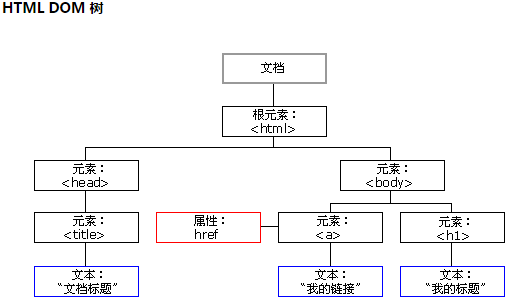
下面举例说明:
有如下html文档:
<!DOCTYPE html> <html> <head> <meta charset="UTF-8"> <title>Document</title> </head> <body> <input type="button" value="Node测试" onclick="test()" /><br> <table border="1px"> <tr> <td></td> <td><input type="button" value="向上走" onclick="move(this)" /></td> <td></td> </tr> <tr> <td><input type="button" value="向左走" onclick="move(this)" /></td> <td></td> <td><input type="button" value="向右走" onclick="move(this)" /></td> </tr> <tr> <td></td> <td><input type="button" value="向下走" onclick="move(this)" /></td> <td></td> </tr> </table> <!--把乌龟放在div中--> <div id="wugui" style="position:absolute;left:100px;top:120px;"> <img src="1.jpg" border="1px" alt="" /> </div> <!--鸡放在div中--> <div id="cock" style="position:absolute;left:200px;top:200px;"> <img src="2.jpg" border="1px" alt="" /> </div> </body> </html>
则dom树为:
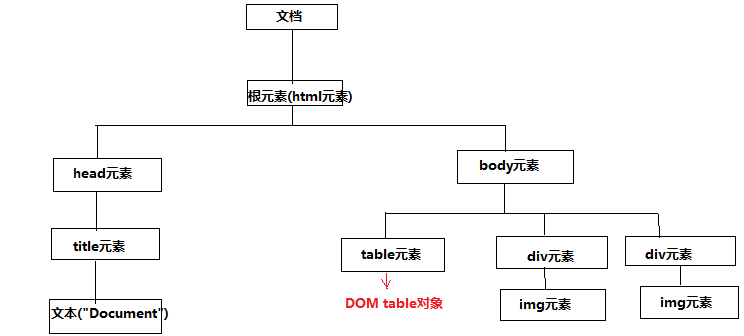
bom简介
BOM(The Browser Object Model)--浏览器对象模型
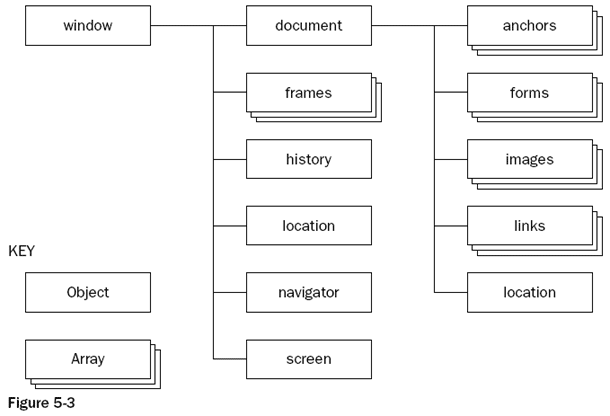
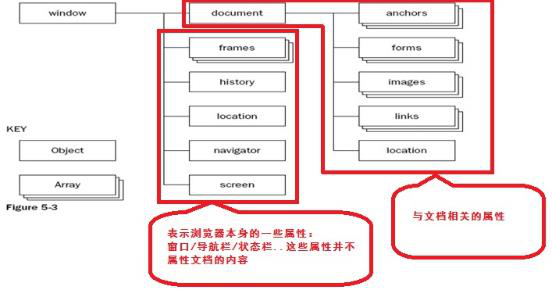
通过使用BOM,可移动窗口、更改状态栏文本。bom是w3c组织提出的,他建议所有的浏览器都应当遵循这样的设计规范,可以说bom和dom关系密切,相互影响,bom为纲,dom为目,我们可以简单的理解dom就是bom的具体实现。
dom简介
- dom(document object model)文档对象模型,根据w3c dom规定,dom是html和xml的应用程序编程接口(api),dom将html或xml映射成由层次节点组成的模型,根据规范的严格层度,分为1,2,3级。
- dom的核心是提供了一套访问结构化文档的api,核心是对节点各种操作。

dom对象简介
js把浏览器,网页文档和网页文档中的html元素和相应的内置对象来表示,这些内置对象就是dom对象,编程人员通过访问dom对象,就可以实现对浏览器本身、网页文档、网页文档中元素的操作,从而控制浏览器和网页元素的行为和外观。
常用的dom对象一览图
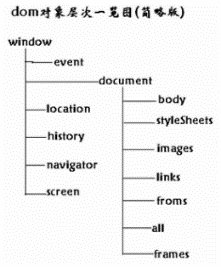
这里,只列举了常用的dom对象。从上图可以看出:
dom对象本身也有层次,比如document对象是window对象的一个成员属性,而body对象又是document对象的一个成员属性。
而在前面说过,dom编程其实就是把网页文档看做是一棵树(html dom tree)(倒的),然后用相应的dom对象去访问网页文档,从而达到控制浏览器和网页的行为和外观。

window对象
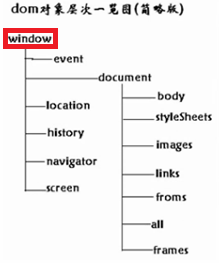
window对象表示一个浏览器窗口或一个框架。在客户端javascript中,window对象是全局对象,要引用当前窗口根本不需要特殊的语法,可以把那个窗口的属性作为全局变量来用。在使用window对象的方法和属性的时候,可以不带window,比如:window.alert("李阿昀!");,可以直接写成alert("李阿昀!");
讲解window对象常用的函数和属性,其它的参考http://www.w3school.com.cn/jsref/dom_obj_window.asp,还有很多可能需要在做项目的时候,才会接触。
| confirm() | 显示带有一段信息以及确认按钮和取消按钮的对话框 |
说明:如果用户点击确定按钮,则confirm()返回 true。如果点击取消按钮,则confirm()返回 false。如下例:
<!DOCTYPE html> <html> <head> <meta charset="UTF-8"> <title>Document</title> <script type="text/javascript"> function test() { var result = window.confirm("你要删除吗?"); if(result) { window.alert("删除"); } else { window.alert("放弃删除"); } } </script> </head> <body> <input type="button" value="删除记录" onclick="test()" /> </body> </html>
| setInterval() | 按照指定的周期(以毫秒计)来调用函数或计算表达式 |
| clearInterval() | 取消由 setInterval()设置的timeout |
说明:setInterval()方法会不停地调用函数,直到clearInterval()被调用或窗口被关闭。由setInterval()返回的ID值可用作clearInterval()方法的参数。
记住:setInterval()函数会先等待再执行(如何让它先执行再等待?这是一个疑问。)
案例1:需求每隔5秒钟弹出hello world!
代码如下:
<!DOCTYPE html> <html> <head> <meta charset="UTF-8"> <title>Document</title> <script type="text/javascript"> function sayHello() { window.alert("hello, world!"); } setInterval("sayHello()", 5000); </script> </head> <body> </body> </html>
案例2:模拟一个时钟。
代码如下:
<!DOCTYPE html> <html> <head> <meta charset="UTF-8"> <title>Document</title> <script type="text/javascript"> function showTime() { //在元素间的文本就是通过对象名.innerText设置的 document.getElementById("mytime").innerText = new Date().toLocaleString(); } setInterval("showTime()", 1000); </script> </head> <body> <span id="mytime"></span><br/> </body> </html>
案例3:让静态图片动起来!(图片有点多,就不放上来了)
代码如下:
<!DOCTYPE html> <html> <head> <meta charset="UTF-8"> <title>Document</title> <script type="text/javascript"> //让静态图片动起来 var n = 1; function runChild() { //得到myimg对象 //window.alert(myimg.src); var myimg = document.getElementById("myimg"); myimg.src = ((n++ % 13)+1)+".jpg"; } var myTimer = setInterval("runChild()", 1000); </script> </head> <body> <div> <img src="1.jpg" id="myimg" /> </div> </body> </html>
进一步,扩展要求:小人动10s就停止。
代码如下:
<!DOCTYPE html> <html> <head> <meta charset="UTF-8"> <title>Document</title> <script type="text/javascript"> var count = 0; var n = 1; //让静态图片动起来 function runChild() { count++; if(count == 11) { //停止这个定时器 clearInterval(myTimer); } //得到myimg对象 //window.alert(myimg.src); var myimg = document.getElementById("myimg"); myimg.src = ((n++ % 13)+1)+".jpg"; } var myTimer = setInterval("runChild()", 1000); </script> </head> <body> <div> <img src="1.jpg" id="myimg" /> </div> </body> </html>
| setTimeout() | 在指定的毫秒数后调用函数或计算表达式 |
| clearTimeout() | 取消由setTimeout()方法设置的timeout |
说明:setTimeout()只执行code一次。如果要多次调用,请使用setInterval()或者让code自身再次调用setTimeout()。
案例4:延时5秒弹出hello对话框。
代码如下:
<!DOCTYPE html> <html> <head> <meta charset="UTF-8"> <title>Document</title> <script type="text/javascript"> //5秒后调用sayHello() function sayHello() { window.alert("hello"); } setTimeout("sayHello()", 5000); </script> </head> <body> </body> </html>
案例5:让静态图片动起来!动10s就停下,接着歇5秒再动,循环往复...
代码如下:
<!DOCTYPE html> <html> <head> <meta charset="UTF-8"> <title>Document</title> <script type="text/javascript"> var count = 0; var n = 1; //让静态图片动起来 function runChild() { count++; if(count == 11) { //停止这个定时器 clearInterval(myTimer); setTimeout("reRun()", 5000);//歇5秒 count = 0; } //得到myimg对象 //window.alert(myimg.src); var myimg = document.getElementById("myimg"); myimg.src = ((n++ % 13)+1)+".jpg"; } //setInterval函数会先等待再执行(如何让它先执行再等待?) var myTimer = setInterval("runChild()", 1000); function reRun() { myTimer = setInterval("runChild()", 1000); } </script> </head> <body> <div> <img src="1.jpg" id="myimg" /> </div> </body> </html>
我觉得setTimeout()和setInterval()并不是那么简单的,上面的这些就是一些初步了解而已,希望自己以后能彻底能搞明白!
| moveTo() | 把窗口的左上角移动到一个指定的坐标 |
| moveBy() | 可相对窗口的当前坐标把它移动指定的像素 |
如下示例:
<!DOCTYPE html> <html> <head> <meta charset="UTF-8"> <title>Document</title> <script type="text/javascript"> function test() { window.moveTo(100, 100);// 需在窗口化下才可看到演示 var move = window.confirm("是否再次移动?"); if(move) { window.moveBy(100, 100); } } </script> </head> <body> <input type="button" value="移动" onclick="test()" /> </body> </html>
| resizeTo() | 把窗口大小调整为指定的宽度和高度 |
| resizeBy() | 根据指定的像素来调整窗口的大小 |
如下例:
<!DOCTYPE html> <html> <head> <meta charset="UTF-8"> <title>Document</title> <script type="text/javascript"> function test() { resizeBy(300,200); } function test2() { resizeTo(400,500); } </script> </head> <body> <input type="button" value="按像素调整窗口大小" onclick="test()" /><br/> <input type="button" value="指定窗口为宽400高500" onclick="test2()" /> </body> </html>
下面再讲一个open()函数的使用,可参考http://www.w3school.com.cn/jsref/met_win_open.asp#windowfeatures。
示例如下:
<!DOCTYPE html> <html> <head> <meta charset="UTF-8"> <title>Document</title> <script type="text/javascript"> function test() { window.open("newWindow.html","_blank","channelmode=yes,resizable=no,width=800,height=800,location=no"); } </script> </head> <body> <input type="button" value="打开一个新窗口" onclick="test()" /> </body> </html>
| opener属性 | 返回对创建该窗口的 Window 对象的引用 |
opener属性非常有用,创建的窗口可以引用创建它的窗口所定义的属性和函数。
例:opener父窗口和子窗口通信。(只在IE9中通过测试)
父窗口(window.html):
<!DOCTYPE html> <html> <head> <meta charset="UTF-8"> <title>Document</title> <script type="text/javascript"> var newWindow; function test2() { newWindow = window.open("newWindow.html","_blank","channelmode=yes,resizable=no,width=600,height=500,location=no"); } function test3() { newWindow.document.getElementById("info").value = $("info2").value; } function $(id) { return document.getElementById(id); } </script> </head> <body> 我是一个窗口 <input type="button" value="打开新窗口" onclick="test2()" /> <span id="myspan">消息</span><br/> <input type="text" value="" id="info2" /><input type="button" value="通知给子窗口" onclick="test3()" /> </body> </html>
子窗口(newWindow.html):
<!DOCTYPE html> <html> <head> <meta charset="UTF-8"> <title>Document</title> <script type="text/javascript"> function notify() { var val = document.getElementById("info").value; opener.document.getElementById("myspan").innerText = val; } </script> </head> <body> 我是新窗口 <input type="text" value="" id="info" /><input type="button" value="通知给父窗口" onclick="notify()" /> </body> </html>
在掌握window对象一些常用方法后,我们来看几个案例。
一个js版本的用户登录系统,当用户输入admin密码是123456就跳到第二页面,4秒后,自动跳转到第三个页面。
login.html:
<!DOCTYPE html> <html> <head> <meta charset="UTF-8"> <title>Document</title> <script type="text/javascript"> function checkUser() { if($("uname").value == "admin" && $("pwd").value == "123456") { //window.alert("ok"); return true; } else { //window.alert("no ok"); $("uname").value = ""; $("pwd").value = ""; return false; } } function $(id) { return document.getElementById(id); } </script> </head> <body> <form action="ok.html"> 账号:<input type="text" id="uname" /><br/> 密码:<input type="password" id="pwd" /><br/> <input type="submit" onclick="return checkUser()" value="登录" /> </form> </body> </html>
过渡页面(ok.html):
<!DOCTYPE html> <html> <head> <meta charset="UTF-8"> <title>Document</title> <script type="text/javascript"> function changeSec() { $("myspan").innerText = parseInt($("myspan").innerText) - 1; } var myTimer = setInterval("changeSec()", 1000); function tiao() { clearInterval(myTimer); window.open("manage.html", "_self"); } setTimeout("tiao()", 5000); //等价于setTimeout("javascript:window.open('manage.html', '_self')", 5000); function $(id) { return document.getElementById(id); } </script> </head> <body> 登录成功!<span id="myspan">5</span>秒后自动跳转到管理页面 </body> </html>
manage.html:
<!DOCTYPE html> <html> <head> <meta charset="UTF-8"> <title>Document</title> </head> <body> 管理界面 </body> </html>
status的使用(可以控制状态栏信息),IE9和Chrome均没通过测试:
<!DOCTYPE html> <html> <head> <meta charset="UTF-8"> <title>Document</title> <script language="javascript" type="text/javascript"> <!-- var space_num=0; var dir=1; function myScroll(){ var space_my=""; space_num=space_num+1*dir; if(space_num>50||space_num<0){ dir=dir*-1; } for(var i=0;i<space_num;i++){ space_my=space_my+" "; } window.status=space_my+"世界你好!"; } function startIt(){ setInterval("myScroll()",100); } //--> </script> </head> <body onload="startIt()"> </body> </html>
history对象
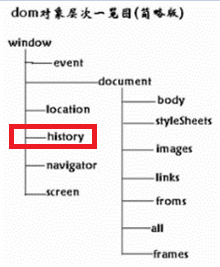
history对象:Contains information about the URLs visited by the client,即:该对象包含客户端访问过的URL信息。
从dom层次图看,history是window对象的成员属性,但实际history是由js runtime engine自动创建的,所以你也可以认为history就是一个js对象。
history对象常用的函数和属性可参考http://www.w3school.com.cn/jsref/dom_obj_history.asp。
例,
historyA.html:
<!DOCTYPE html> <html> <head> <meta charset="UTF-8"> <title>Document</title> </head> <body> <a href="historyB.html">goto historyB</a> </body> </html>
historyB.html:
<!DOCTYPE html> <html> <head> <meta charset="UTF-8"> <title>Document</title> <script type="text/javascript"> function goback() { window.alert(history.length); history.back();//等价于history.go(-1); } </script> </head> <body> <!-- 不只是input可以有onclick事件 --> <a href="#" onclick="goback()">返回上一级页面</a> </body> </html>
location对象
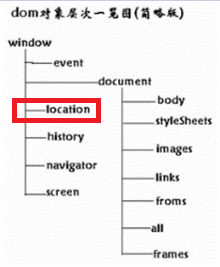
location对象:Contains information about the current URL。即:该对象包含客户端当前URL信息。
从dom层次图看,location是window对象的成员属性,但实际location也是由js runtime engine自动创建的,所以你也可以认为location就是一个js对象。
location属性和方法可参考http://www.w3school.com.cn/jsref/dom_obj_location.asp。
例,
<!DOCTYPE html> <html> <head> <meta charset="UTF-8"> <title>Document</title> <script type="text/javascript"> function test() { location.reload();//等同刷新页面 //window.alert(location.href+" || "+location.hostname+" || "+location.port); } </script> </head> <body> 12345677 <input type="button" value="刷新页面" onclick="test()" /> </body> </html>
navigator对象
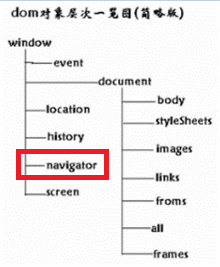
navigator对象:Contains information about the browser,即:该对象包含当前浏览器的各信息。
从dom层次图看,navigator是window对象的成员属性,但实际navigator也是由js runtime engine自动创建的,所以你也可以认为navigator就是一个js对象。
navigator对象常用的函数和属性可参考http://www.w3school.com.cn/jsref/dom_obj_navigator.asp。
例,
<!DOCTYPE html> <html> <head> <meta charset="UTF-8"> <title>Document</title> <script type="text/javascript"> document.write("<p>Name: "); document.write(navigator.appName + "</p>"+navigator.platform+" "+navigator.systemLanguage); </script> </head> <body> </body> </html>
screen对象
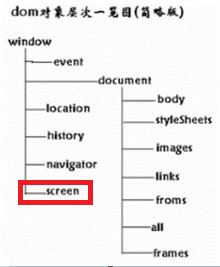
screen对象:Contains information about the client's screen and rendering capabilities,即:该对象包含有关客户机显示屏幕的信息。
从dom层次图看,screen是window对象的成员属性,但实际screen也是由js runtime engine自动创建的,所以你也可以认为screen就是一个js对象。
screen对象常用的属性可参考http://www.w3school.com.cn/jsref/dom_obj_screen.asp。
例,
<!DOCTYPE html> <html> <head> <meta charset="UTF-8"> <title>Document</title> <script type="text/javascript"> document.write(screen.width+" "+screen.height+" "+screen.availHeight); </script> </head> <body> </body> </html>
event对象

event对象代表事件的状态,比如事件在其中发生的元素、键盘按键的状态、鼠标的位置、鼠标按钮的状态,事件通常与函数结合使用。
从dom对象层次图看,event对象是window对象的属性,其实在其它的dom对象中都存在event事件(一种event对象就代表一类事件),理解这一点非常重要!
事件驱动编程
所谓事件驱动,简单地说就是你点什么按钮(即产生什么事件),电脑执行什么操作(用什么函数)。当然事件不仅限于用户的操作,当对象处于某种状态时,可以获得消息通知,然后对这个消息感兴趣的程序就可以执行。
事件驱动编程的几个核心对象
事件源:谁发出事件通知,发出消息就是事件主体。
事件名称:发出什么样的通知的名称,比如鼠标到我头上了,我被别人点了一下。
事件响应函数:谁对这个事件感兴趣,当这个事件发生时要执行什么样的操作。
事件对象:一般来说,当事件发生时,会产生一个描述该事件的具体对象,包括具体的参数一起发给响应函数,好让他们通过事件对象来了解事件更加详细的信息。
特别注意:前面已详细讲解了event事件,这里就不在详细阐述了。
如何绑定事件监听
- 直接在某个html控件上指定
- getElementById("xxx")获取控件后,再绑定
- 通过addEventListener()或者是attachEvent()来绑定
- 一个事件可以有多个事件监听者(函数)
W3C DOM标准:
[Object].addEventListener("name_of_event",fnHandler,bCapture);
[Object].removeEventListener("name_of_event",fnHandler,bCapture);
IE中独有的事件监听方法:
[Object].attachEvent("name_of_event_handler",fnHandler);
[Object].detachEvent("name_of_event_handler",fnHandler);
①通过getElementById("")获取控件后绑定事件
<!DOCTYPE html>
<html>
<head>
<meta charset="UTF-8">
<title>Document</title>
<script type="text/javascript">
function test() {
alert("hello");
}
</script>
</head>
<body>
<input id="but" type="button" value="测试" />
<script type="text/javascript">
document.getElementById("but").onclick = test;
</script>
</body>
</html>
此绑定比较类似于:
function Person() { } var p = new Person(); p.fun1 = function() { }
②在IE下通过attachEvent绑定和detachEvent解除绑定
<!DOCTYPE html>
<html>
<head>
<meta charset="UTF-8">
<title>Document</title>
<script type="text/javascript">
function test() {
window.alert("你投了一次票");
//解除事件绑定
document.getElementById("but").detachEvent("onclick", test);
}
</script>
</head>
<body>
<input id="but" type="button" value="投票" />
<script type="text/javascript">
document.getElementById("but").attachEvent("onclick", test);
</script>
</body>
</html>
如何获取事件对象
dom会将事件对象通过参数传递给响应函数(事件监听函数),而ie则可以直接通过window.event来获取事件对象。
非IE浏览器
DOM中获取事件对象:DOM中要求event是传给事件响应函数的第一个参数。
oDiv.onclick=function(){ var oEvent=arguments[0]; //oEvent即为事件对象 }
或
oDiv.onclick=function(oEvent){ //参数oEvent即为事件对象 }
IE浏览器
IE中的Event对象-window.event
oDiv.onclick=function(){ var oEvent=window.event; //oEvent就是事件对象 }
这里特别强调一点,并不是所有的html元素都有相同的event事件(对象),这个请大家在做项目的时候特别注意,比如提交按钮有onsubmit事件,但是输入框就没有的,具体参考js帮助文档。
案例:要求用户在一个输入框中输入一个数,如果不是数字,则给出提示。
<!DOCTYPE html>
<html>
<head>
<meta charset="UTF-8">
<title>Document</title>
<script type="text/javascript">
function test(e) {
//用户每按下一个键,就去判断是不是一个数
if(e.keyCode < 48 || e.keyCode > 57) {
window.alert("您输入的不是数");
//window.event.returnValue = false;
return false;
}
}
</script>
</head>
<body>
<input type="text" onkeypress="return test(event)" id="text1" />
</body>
</html>



